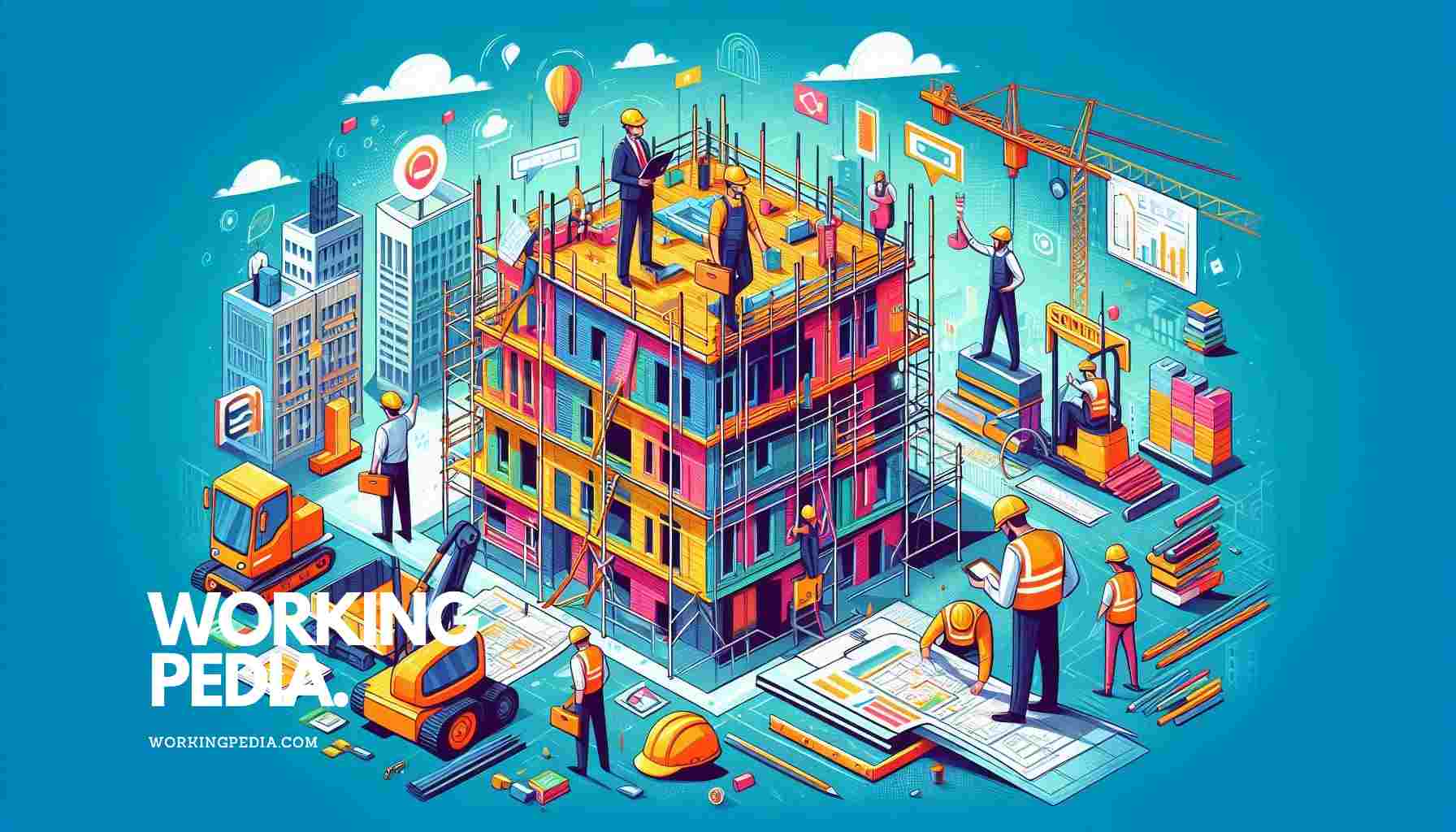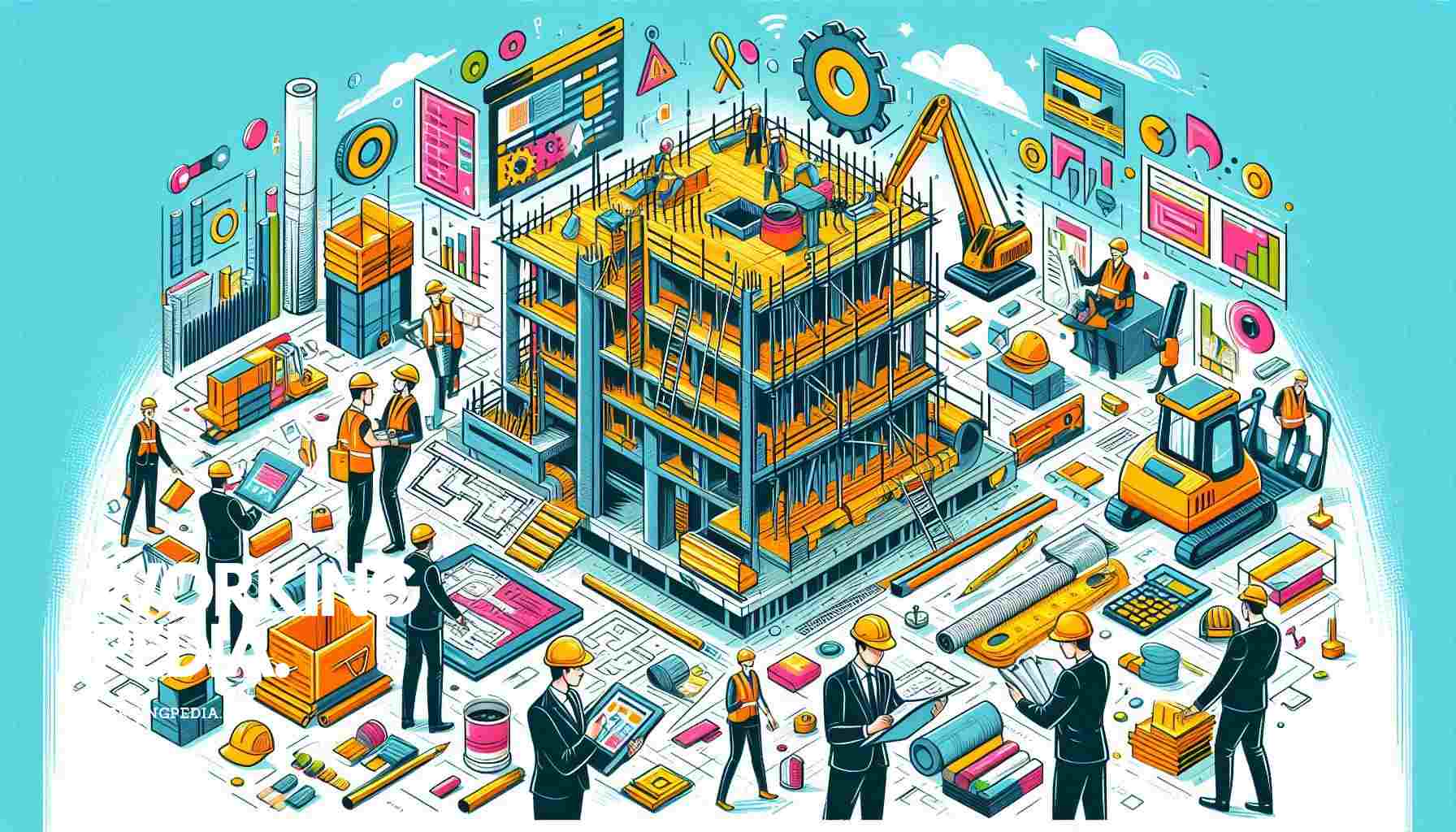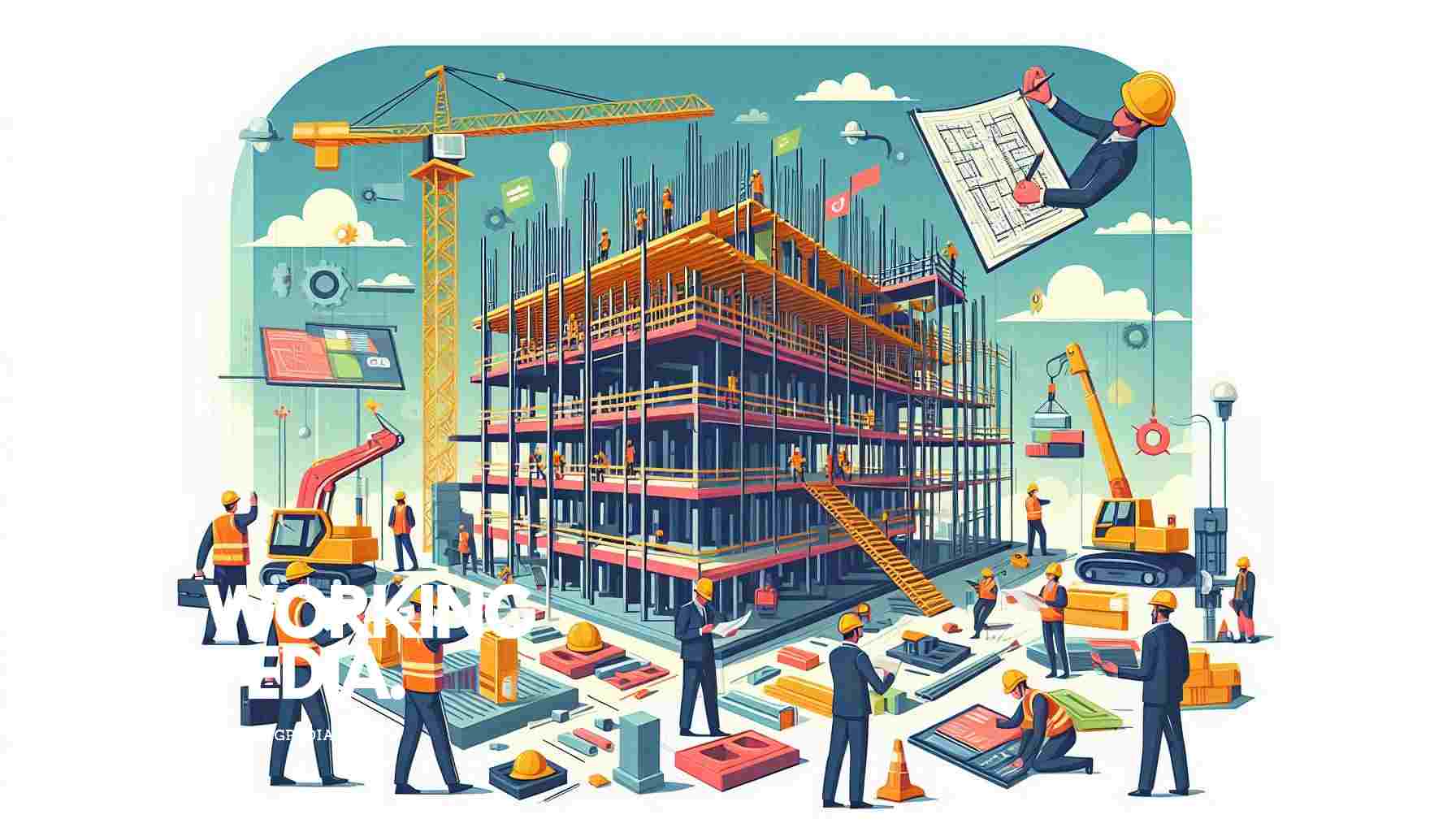Imagine standing on an empty lot, envisioning a towering skyscraper or a sprawling residential complex. Now, picture yourself as the mastermind behind turning that vision into reality. That’s construction management in a nutshell – the art and science of orchestrating the complex symphony of building projects from inception to completion.
Construction management is the backbone of the building industry, ensuring that projects are completed on time, within budget, and to the highest standards of quality and safety. It’s a field that demands a unique blend of technical know-how, leadership skills, and creative problem-solving abilities.
Before we dive deeper into the world of construction management1, let’s take a quick look at some key takeaways:
Key Takeaways
- Construction management involves overseeing all aspects of building projects, from planning and design to execution and delivery.
- Effective construction managers need a diverse skill set, including technical knowledge, communication abilities, and financial acumen.
- The construction management process typically involves five main phases: initiation, planning, execution, monitoring, and closing.
- Technology is playing an increasingly important role in modern construction management, with tools like Building Information Modeling (BIM) revolutionizing the field.

What is Construction Management?
At its core, construction management is the process of overseeing and coordinating all aspects of a building project. It’s like being the conductor of an orchestra, ensuring that every instrument – or in this case, every team and element of the project – works in harmony to create a masterpiece.
Construction managers are responsible for a wide range of tasks, including:
- Project planning and scheduling
- Cost estimation and budgeting
- Quality control and safety management
- Coordination of various contractors and subcontractors
- Communication with clients, architects, and other stakeholders
- Risk assessment and mitigation
It’s a role that requires wearing many hats and juggling multiple responsibilities simultaneously. One day, you might be poring over blueprints and discussing design changes with architects. The next, you could be negotiating with suppliers or troubleshooting an unexpected issue on the construction site.
The Construction Management Process
Now that we’ve got a basic understanding of what construction management entails, let’s break down the process into its main phases. While every project is unique, most follow a similar lifecycle:
1. Initiation Phase
This is where it all begins. The initiation phase involves defining the project scope, objectives, and feasibility. It’s during this stage that the project team is assembled, and initial budgets and timelines are established.
I remember my first major project as a construction manager a 30 story office building in downtown Chicago. The excitement of those early meetings, brainstorming sessions, and site visits still gives me goosebumps. It’s where the magic starts to happen!
2. Planning Phase
Once the project gets the green light, it’s time to dive into detailed planning. This phase involves:
- Developing a comprehensive project plan
- Creating detailed schedules and timelines
- Estimating costs and preparing budgets
- Identifying potential risks and developing mitigation strategies
- Obtaining necessary permits and approvals
The planning phase is crucial for setting the project up for success. It’s where you lay the foundation (pun intended!) for everything that follows. I’ve learned the hard way that skimping on planning almost always leads to headaches down the road.
3. Execution Phase
This is where the rubber meets the road – or in our case, where the concrete starts pouring. The execution phase is all about bringing the plans to life. As a construction manager, your role during this phase includes:
- Coordinating and supervising construction activities
- Managing resources and logistics
- Ensuring compliance with safety regulations and quality standards
- Resolving conflicts and addressing issues as they arise
- Communicating progress to stakeholders
The execution phase is often the longest and most challenging part of the project. It’s where your problem-solving skills and ability to think on your feet are put to the test. I’ve had days where I felt like a firefighter, putting out one crisis after another. But there’s nothing quite like the satisfaction of seeing a building take shape before your eyes.
4. Monitoring and Controlling Phase
While the execution phase is ongoing, the monitoring and controlling phase runs parallel to it. This phase involves:
- Tracking progress against the project plan
- Managing changes to the project scope
- Monitoring costs and ensuring adherence to the budget
- Conducting regular quality inspections
- Identifying and addressing any deviations from the plan
Effective monitoring and control are essential for keeping the project on track. It’s like having your finger on the pulse of the project at all times. I’ve found that regular site walks and team meetings are invaluable for staying on top of things and nipping potential issues in the bud.

Key Skills for Successful Construction Management
Being a successful construction manager requires a diverse set of skills. Some of the most important ones include:
Technical Knowledge
A solid understanding of construction methods, materials, and technologies is essential. You don’t need to be an expert in every trade, but you should have a good working knowledge of all aspects of construction.
I remember feeling overwhelmed when I first started out, trying to keep up with all the technical jargon and specifications. But over time, I’ve learned that it’s okay to ask questions and lean on the expertise of your team members. The key is to be curious and always willing to learn.
Communication Skills
Construction management involves coordinating with a wide range of stakeholders, from laborers and subcontractors to clients and regulatory bodies. Clear, effective communication is crucial for keeping everyone on the same page and ensuring smooth project execution.
I’ve found that being a good listener is just as important as being able to articulate your ideas clearly. Sometimes, the best solutions come from really hearing what your team members or clients are saying – even if they’re not saying it explicitly.
Leadership and Team Management
As a construction manager, you’re not just managing a project – you’re leading a team. This requires the ability to motivate, delegate, and resolve conflicts effectively.
I’ve learned that leading by example and fostering a collaborative environment can make a huge difference in team performance. When your team feels valued and empowered, they’re more likely to go the extra mile to ensure the project’s success.
Problem-Solving and Decision-Making
Construction projects rarely go exactly as planned. The ability to think on your feet, analyze complex situations, and make quick, informed decisions is crucial.
I remember a project where we discovered unexpected soil conditions during excavation. It required a complete redesign of the foundation system. Being able to quickly assess the situation, consult with experts, and make a decision on how to proceed saved us from significant delays and cost overruns.
Financial Management
Understanding budgets, cost control, and financial reporting is a key part of construction management. You need to be able to track expenses, forecast costs, and make financial decisions that keep the project profitable.
I’ve found that developing a good relationship with your finance team and really understanding the financial aspects of your projects can give you a significant edge as a construction manager.

The Role of Technology in Modern Construction Management
The construction industry has traditionally been slow to adopt new technologies, but that’s changing rapidly. Today, technology plays a crucial role in modern construction management, helping to improve efficiency, reduce errors, and enhance communication.
Some of the key technologies revolutionizing the field include:
Building Information Modeling (BIM)
BIM is a 3D model-based process that gives architecture, engineering, and construction professionals the insights and tools to more efficiently plan, design, construct, and manage buildings and infrastructure.
I remember the first time I used BIM on a project – it was like stepping into the future. Being able to virtually walk through the building before a single brick was laid was a game-changer. It allowed us to identify and resolve potential issues early in the design phase, saving time and money during construction.
Project Management Software
Specialized software tools help construction managers keep track of schedules, budgets, resources, and documentation. These tools often include features like Gantt charts, resource allocation, and real-time collaboration capabilities.
I’ve found that while these tools can greatly enhance productivity, it’s important to choose one that fits your team’s specific needs and work style. The best tool is the one that your team will actually use consistently.
Drones and 3D Scanning
Drones and 3D scanning technology are increasingly being used for site surveys, progress monitoring, and safety inspections. They provide a bird’s-eye view of the construction site and can capture detailed data quickly and accurately.
Using drones for site inspections has been a real eye-opener for me. They allow us to access hard-to-reach areas safely and efficiently, providing invaluable insights into the progress and quality of work.
As we continue to explore the world of construction management, we’ll delve deeper into some of these technologies and how they’re shaping the future of the industry. But first, let’s take a closer look at some of the challenges and best practices in construction project management…
Challenges and Best Practices in Construction Project Management
Managing construction projects ain’t always a walk in the park. There’s a bunch of challenges that can pop up, but with the right approach, you can tackle ’em head-on. Let me share some of the common hurdles I’ve faced and the best practices I’ve picked up along the way.
Dealing with Unexpected Changes
Change is the only constant in construction, and boy, have I learned that the hard way! Whether it’s last-minute design modifications or unexpected site conditions, changes can throw a wrench in your carefully laid plans. The key is to stay flexible and have a solid change management process in place.
• Establish a clear change order process
• Communicate changes to all stakeholders promptly
• Assess the impact on schedule and budget
• Document everything meticulously
Managing Stakeholder Expectations
Balancing the often conflicting expectations of clients, contractors, and other stakeholders can be like walking a tightrope. I’ve found that setting clear expectations from the get-go and maintaining open lines of communication throughout the project is crucial.
Regular progress meetings and detailed reports help keep everyone on the same page. And don’t be afraid to have those tough conversations when needed – it’s better to address issues early than let them fester.
Ensuring Safety on Site
Safety should always be your top priority. I’ve seen firsthand how a lax approach to safety can lead to accidents, injuries, and even fatalities. It’s not just about following regulations – it’s about creating a culture of safety on site.
• Conduct regular safety training sessions
• Perform daily safety inspections
• Encourage workers to report potential hazards
• Lead by example – always wear proper PPE on site
Managing Quality Control
Delivering a high-quality project is what separates the good construction managers from the great ones. It’s not just about meeting specifications – it’s about exceeding expectations and creating something you can be proud of.
I’ve found that implementing a comprehensive quality control program, with regular inspections and clear quality standards, is essential. And don’t forget to celebrate when your team achieves quality milestones – it helps reinforce the importance of quality work.
Sustainability in Construction Management
Sustainability is no longer just a buzzword – it’s becoming a fundamental aspect of construction management. As someone who’s passionate about leaving a positive impact on the world, I’ve been excited to see the industry moving in this direction.
Green Building Practices
Incorporating green building practices into your projects isn’t just good for the environment – it can also lead to cost savings and improved building performance. Some key areas to focus on include
• Energy efficiency
• Water conservation
• Sustainable materials
• Waste reduction and recycling
I remember working on a LEED Platinum certified office building a few years back. The amount of thought and planning that went into every aspect of the design and construction was mind-blowing. But seeing the finished product – a building that was not only beautiful but also incredibly efficient and environmentally friendly – was incredibly rewarding.
Lifecycle Considerations
As construction managers, we need to think beyond just the construction phase. Considering the entire lifecycle of a building – from design and construction to operation and eventual demolition – is crucial for true sustainability.
This might mean choosing materials that are more durable or easier to recycle, or designing systems that are easier to maintain and upgrade over time. It’s about thinking long-term and considering the bigger picture.
The Future of Construction Management
The construction industry is evolving rapidly, and it’s an exciting time to be a part of it. As we look to the future, there are several trends that I believe will shape the field of construction management in the coming years.
Increased Adoption of AI and Machine Learning
Artificial intelligence and machine learning are set to revolutionize how we plan and execute construction projects. From predictive analytics for risk management to AI-powered scheduling and resource allocation, these technologies have the potential to dramatically improve project outcomes.
I’m particularly excited about the potential of AI in safety management. Imagine being able to predict and prevent accidents before they happen – that’s the kind of game-changing technology that could save lives.
Virtual and Augmented Reality
VR and AR technologies are already making waves in the industry, and I believe we’ve only scratched the surface of their potential. From virtual walkthroughs for clients to AR-assisted construction and maintenance, these technologies are changing how we visualize and interact with our projects.
I recently used VR to help a client visualize different design options for their new office space. The look on their face when they ‘stepped into’ their future office was priceless – it really brought the design to life in a way that 2D drawings never could.
Modular and Off-Site Construction
The shift towards modular and off-site construction is gaining momentum, and for good reason. These methods can lead to faster construction times, improved quality control, and reduced waste. As construction managers, we’ll need to adapt our processes and skillsets to effectively manage these new construction methods.
I’m currently working on a project that’s using prefabricated bathroom pods. It’s been a learning curve, but the speed and consistency we’re achieving is impressive. I’m excited to see how this trend develops in the coming years.
As we wrap up our journey through the world of construction management, I hope you’ve gained a deeper appreciation for this challenging yet rewarding field. From the initial spark of an idea to the final handover of a completed project, construction management is about bringing visions to life and creating spaces that will stand the test of time.
Whether you’re a seasoned pro or just starting out in the industry, remember that every project is an opportunity to learn, grow, and make a positive impact on the world around us. So put on that hard hat, roll up your sleeves, and let’s build something amazing!
Frequently Asked Questions
1. What exactly does a construction manager do?
A construction manager oversees all aspects of a building project from start to finish. This includes planning, coordinating with various teams, managing budgets and schedules, ensuring safety and quality standards are met, and communicating with stakeholders. They’re essentially the conductor of the orchestra, making sure all parts of the project work together harmoniously.
2. How do I become a construction manager?
To become a construction manager, you typically need a bachelor’s degree in construction management, civil engineering, or a related field. Many employers also value practical experience, so internships or entry-level positions in construction can be beneficial. Additionally, obtaining certifications like the Certified Construction Manager (CCM) can enhance your credentials and job prospects.
3. What skills are most important for a construction manager?
Key skills for a construction manager include strong leadership and communication abilities, problem-solving skills, technical knowledge of construction methods and materials, financial management skills, and the ability to read and interpret blueprints and technical documents. Time management and the ability to multitask are also crucial.
4. How does technology impact construction management?
Technology is revolutionizing construction management. Tools like Building Information Modeling (BIM) allow for better visualization and planning. Project management software improves coordination and communication. Drones and 3D scanning technologies enhance site surveys and inspections. AI and machine learning are beginning to play a role in predictive analytics and risk management.
5. What are the biggest challenges in construction management?
Some of the biggest challenges include managing unexpected changes, balancing stakeholder expectations, ensuring site safety, controlling costs, meeting tight deadlines, and maintaining quality standards. Additionally, dealing with labor shortages and adapting to new technologies and construction methods can be challenging.
6. How important is sustainability in modern construction management?
Sustainability is increasingly important in construction management. Many clients and regulations now require green building practices. This involves considering energy efficiency, water conservation, sustainable materials, and waste reduction throughout the project lifecycle. Sustainable practices can lead to long-term cost savings and reduced environmental impact.
7. What’s the difference between a construction manager and a project manager?
While there’s some overlap, a construction manager typically focuses specifically on construction projects and has more technical knowledge of construction processes. A project manager might work in various industries and focus more on overall project coordination. In construction, a project manager might oversee multiple construction managers on different aspects of a large project.
8. How do construction managers handle risk management?
Risk management in construction involves identifying potential risks early, assessing their potential impact, and developing strategies to mitigate them. This might include creating contingency plans, implementing safety protocols, securing appropriate insurance, and closely monitoring project progress to catch and address issues early.
9. What’s the future of construction management?
The future of construction management is likely to be shaped by increased use of technology, including AI, VR/AR, and advanced project management software. There’s also a trend towards more sustainable and efficient building methods, like modular and off-site construction. The role of construction managers may evolve to include more data analysis and technology management alongside traditional responsibilities.
10. How do construction managers balance quality, cost, and time constraints?
Balancing the “iron triangle” of quality, cost, and time is a core challenge in construction management. It involves careful planning, constant monitoring, and often making tough decisions. Effective communication with all stakeholders is key, as is having a clear understanding of project priorities. Sometimes, trade-offs need to be made, but a good construction manager aims to optimize all three aspects as much as possible.
Must See Related Construction
Construction https://workingpedia.com/category/construction/





